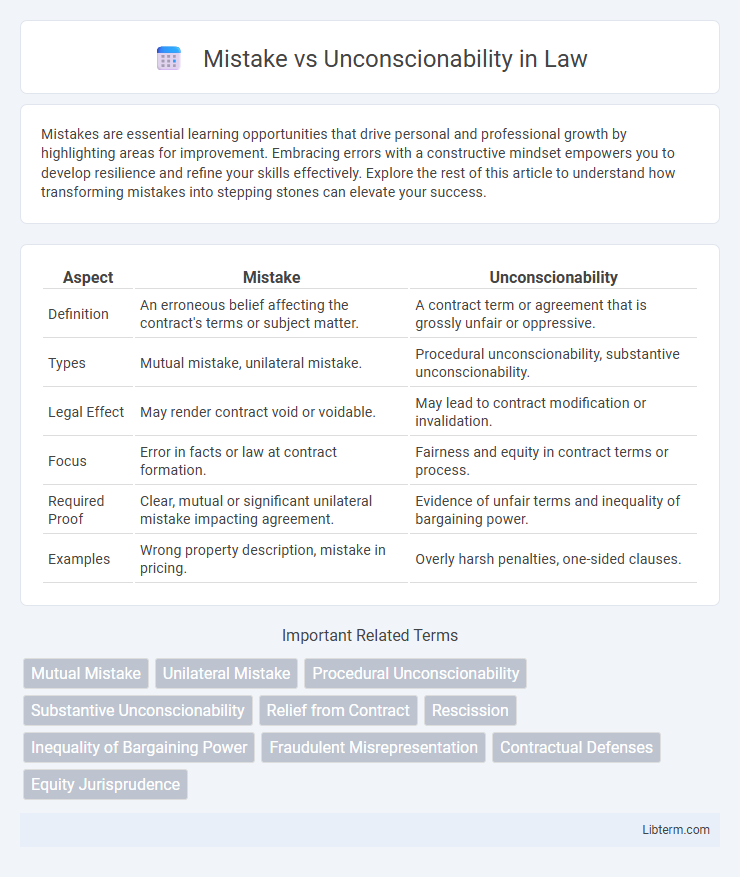Mistakes are essential learning opportunities that drive personal and professional growth by highlighting areas for improvement. Embracing errors with a constructive mindset empowers you to develop resilience and refine your skills effectively. Explore the rest of this article to understand how transforming mistakes into stepping stones can elevate your success.
Table of Comparison
| Aspect | Mistake | Unconscionability |
|---|---|---|
| Definition | An erroneous belief affecting the contract's terms or subject matter. | A contract term or agreement that is grossly unfair or oppressive. |
| Types | Mutual mistake, unilateral mistake. | Procedural unconscionability, substantive unconscionability. |
| Legal Effect | May render contract void or voidable. | May lead to contract modification or invalidation. |
| Focus | Error in facts or law at contract formation. | Fairness and equity in contract terms or process. |
| Required Proof | Clear, mutual or significant unilateral mistake impacting agreement. | Evidence of unfair terms and inequality of bargaining power. |
| Examples | Wrong property description, mistake in pricing. | Overly harsh penalties, one-sided clauses. |
Introduction to Mistake and Unconscionability
Mistake in contract law refers to an erroneous belief held by one or both parties at the time of agreement, affecting the validity or enforceability of the contract. Unconscionability involves terms so unfair or oppressive that they shock the conscience, often seen in contracts of adhesion where one party lacks meaningful choice. Both concepts serve as important defenses or grounds for contract modification to prevent unjust outcomes.
Defining Mistake in Contract Law
Mistake in contract law refers to an erroneous belief held by one or more parties at the time of contract formation, which significantly affects the contract's terms or validity. This can be categorized into mutual mistake, where both parties share the same erroneous assumption, and unilateral mistake, involving only one party's misconception. The presence of a mistake can render a contract voidable if it pertains to a fundamental fact essential to the agreement or significantly impacts the agreed-upon exchange.
Understanding Unconscionability in Contracts
Unconscionability in contracts refers to terms that are so unfair or one-sided that they shock the conscience of the court, often involving significant imbalances in bargaining power between parties. Unlike a mistake, which concerns a factual error affecting contract validity, unconscionability addresses the substantive fairness and procedural factors, such as lack of meaningful choice or oppressive terms. Courts evaluate both procedural unconscionability, including unfair surprise or lack of negotiation, and substantive unconscionability, focusing on overly harsh or one-sided contract provisions that undermine equity in contract enforcement.
Key Differences Between Mistake and Unconscionability
Mistake involves a mutual or unilateral error regarding a fact or assumption at the time of contract formation, impacting the validity of consent, while unconscionability refers to a contract or clause so one-sided that it shocks the conscience, typically due to unequal bargaining power. Key differences include mistake addressing factual inaccuracies or misunderstandings, whereas unconscionability focuses on fairness and oppression in the contract terms. Mistake may void or reform a contract, but unconscionability often leads to voiding or modifying unfair provisions to prevent unjust enrichment.
Types of Mistakes in Legal Agreements
Types of mistakes in legal agreements primarily include unilateral, mutual, and common mistakes, each affecting contract enforceability differently. A unilateral mistake occurs when one party is mistaken about a fundamental fact, often not voiding the contract unless the other party knew of the error. Mutual mistakes involve both parties sharing the same erroneous belief about a vital fact, which can render the contract voidable due to lack of true consent.
Elements of Unconscionable Contracts
Unconscionable contracts are defined by elements of procedural and substantive unconscionability, where procedural refers to unfair bargaining processes and substantive addresses overly harsh or one-sided terms. Courts assess factors such as inadequate disclosure, lack of meaningful choice, and oppressive contract terms to determine unconscionability. Unlike mere mistakes, which involve errors in understanding facts or terms, unconscionability focuses on the fairness and equity of contractual agreements.
Legal Remedies for Mistake
Legal remedies for mistake primarily involve rescission or reformation of a contract when a party is misled about a material fact, thereby nullifying the agreement or adjusting terms to reflect true intent. Courts typically grant relief in cases of mutual or unilateral mistake that significantly affect the contract's foundation, provided the mistaken party did not bear the risk of the error. Unlike unconscionability, which addresses fairness and equity in contract terms, mistake remedies focus on correcting errors in factual understanding to restore contractual fairness.
Judicial Approaches to Unconscionability
Judicial approaches to unconscionability emphasize fairness by scrutinizing both procedural and substantive elements, ensuring contracts are not oppressive or one-sided. Courts analyze factors such as the bargaining power imbalance, lack of meaningful choice, and whether contract terms are unreasonably favorable to one party. Unlike simple mistakes, unconscionability requires evidence of both unfair surprise and harsh terms, leading courts to refuse enforcement of agreements that violate equitable principles.
Case Studies: Mistake vs Unconscionability
Case studies contrasting mistake and unconscionability often highlight how courts differentiate between errors made by parties and situations involving unfair advantage or oppression. In cases like *Smith v. Hughes*, the doctrine of mistake was applied when a party was unaware of a critical fact impacting consent, whereas in *Williams v. Walker-Thomas Furniture Co.*, unconscionability was established due to exploitative contract terms imposed on a vulnerable party. These cases demonstrate the legal thresholds for voiding or modifying contracts based on mistaken assumptions versus inequitable bargaining power.
Practical Implications for Contract Drafting
Mistake and unconscionability impact contract drafting by highlighting the importance of clarity and fairness in terms to avoid disputes. Drafting precise definitions, thorough representations, and fair allocation of risks can reduce the likelihood of a contract being voided due to a mutual or unilateral mistake or deemed unconscionable by courts. Incorporating dispute resolution clauses and ensuring balanced bargaining power protects parties from enforcement issues related to unconscionable terms or mistaken assumptions.
Mistake Infographic

 libterm.com
libterm.com